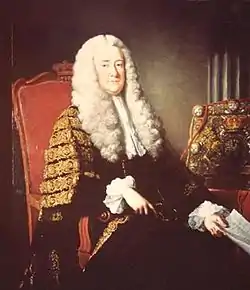Attorney General v Davy
Attorney General v Davy (1741) 26 ER 531 is a UK company law case, which establishes this small but essential point of law: the default rule is that a majority of a corporate body can determine what it does.
| Attorney General v Davy | |
|---|---|
 | |
| Court | Court of Chancery |
| Decided | 1 January 1741 |
| Citation(s) | (1741) 26 ER 531, (1741) 2 Atk 212 |
| Case opinions | |
| Lord Hardwicke LC | |
Equivalent rules in contemporary company law are s 168 Companies Act 2006, which allows shareholders to remove directors through a simple majority, Foss v Harbottle which presupposed that a majority of shareholders can always take action to litigate, and the rule in Automatic Self-Cleansing Filter Syndicate Co Ltd v Cuninghame,[1] which raises the requirement to 75% of the shareholders if they are to give instructions to the board.
Facts
King Edward VI had incorporated twelve people by name in a charter to elect a chaplain for the church of Kirton, just outside Boston, Lincolnshire. A clause stated that three of the twelve would choose a chaplain for the Sandford church as well, another village within the Kirton parish, with the consent of the majority of Sandford residents. A late vacancy had been created. Two of the three chose a chaplain with the majority of residents' consent, but the third dissented. The question was whether the choice was valid.[2]
Judgment
Lord Hardwicke LC held that the chaplain was validly elected, for a corporate body can act by a majority vote at any duly summoned meeting of members.

It cannot be disputed that wherever a certain number are incorporated, a major part of them may do any corporate act; so if all are summoned, and part appear, a major part of those that appear may do a corporate act, though nothing be mentioned in the charter of the major part. This is the common construction of charters, and I am of opinion that the three are a corporation for the purpose they are appointed, and the choice too was confirmed, and consequently not necessary that all the three should join; but if the act to be done by a select number of the twelve had been by a different charter, it would have been otherwise; it is not necessary that every corporate act should be under the seal of the corporation, nor did this need the corporation seal.
Notes
- [1906] 2 Ch 3
- The Report cites the summary and facts as follows, "Case 169.— in the Vacation of Trin. Term , 1741. S. G. cited 1 Ves. 419.—Where a certain number are incorporated, a major part of them may do any corporate act, though nothing be mentioned in the charter. King Edward the Sixth, by charter incorporated twelve persons by name, to elect a chaplain for the church of Kirton, in Lincolnshire , and by another clause three of the twelve were to chuse a chaplain to officiate in the church of Sandford, within the parish of Kirton , with the consent and approbation of the major part of the inhabitants of Sandford. Upon a late vacancy, two of the three chose a chaplain, with the consent of the major part of the inhabitants of Sandford, the third dissented; and the question was, Whether this was a good choice."
Further reading
- R v Varlo (1775) 1 Cowp 248